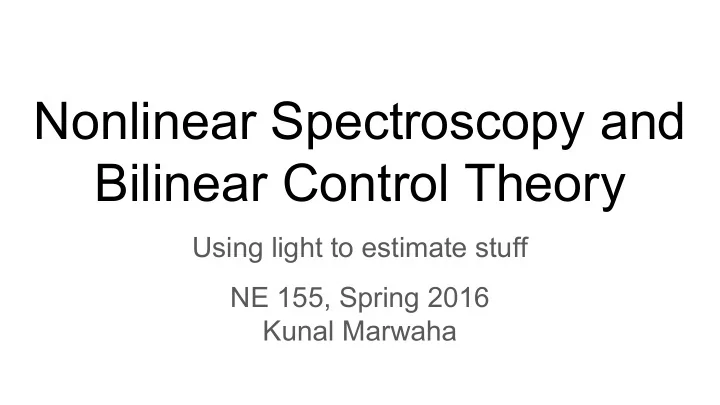

Nonlinear Spectroscopy and Bilinear Control Theory Using light to estimate stuff NE 155, Spring 2016 Kunal Marwaha
Huh? Research project! Prof. Birgitta Whaley (quantum information) On-and-off since Spring 2015 Computational science: theory + simulations
Goal Find physical parameters of molecular system Using spectroscopy! How? http://cdn.phys.org/newman/gfx/news/hires/2013/schrodingerequation1.jpg https://www.mbi-berlin.de/de/research/projects/3.1/topics/history/Subproject5/p3_experiment.jpg
Idea Let’s find a space where equations are linear. Then, we invert! http://i.stack.imgur.com/hx8PR.png We can recursively expand perturbations:
Control Theory Model systems from input-output measurements. http://1.bp.blogspot.com/_U3umjVzCXTA/TJ2qDnhANMI/AAAAAAAAAPk/AHIC2YGuO1U/s1600/I-O-block+diagram.gif https://users.ece.cmu.edu/~koopman/des_s99/control_theory/stateq.gif Hamiltonian is time-dependent!
Pulses Experiments use “ultrafast pulses” (femto-sec) Approximated as Or as rectangular pulse Dirac delta http://idav.ucdavis.edu/~okreylos/PhDStudies/Winter2000/BoxFilter.gif https://upload.wikimedia.org/wikibooks/en/thumb/c/c2/NM16_10.gif/380px-NM16_10.gif
Things simplify! Now we’re linear! To simulate the forward direction, we input A and x(0) to get x(t).
Remember the goal... Find physical parameters: ● transition dipole ● energy splitting ● energy coupling http://sebastianraschka.com/images/faq/visual-backpropagation/nonconvex-cost.png It’s harder than expected, but some iterative methods might work.
Code Part 1: Forward direction http://thumbs.dreamstime.com/z/binary-code-abstract-background- animation-digits-falling-downwards-against-black-42622233.jpg → Does the simulated data match experiment? Part 2: Inversion direction → Can we get physical parameters from data?
Recommend
More recommend